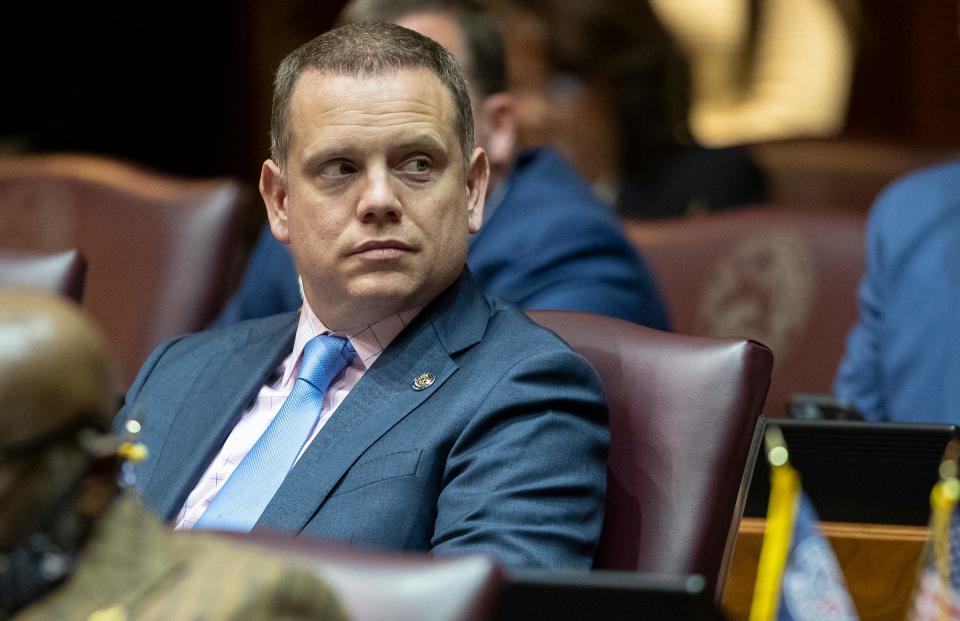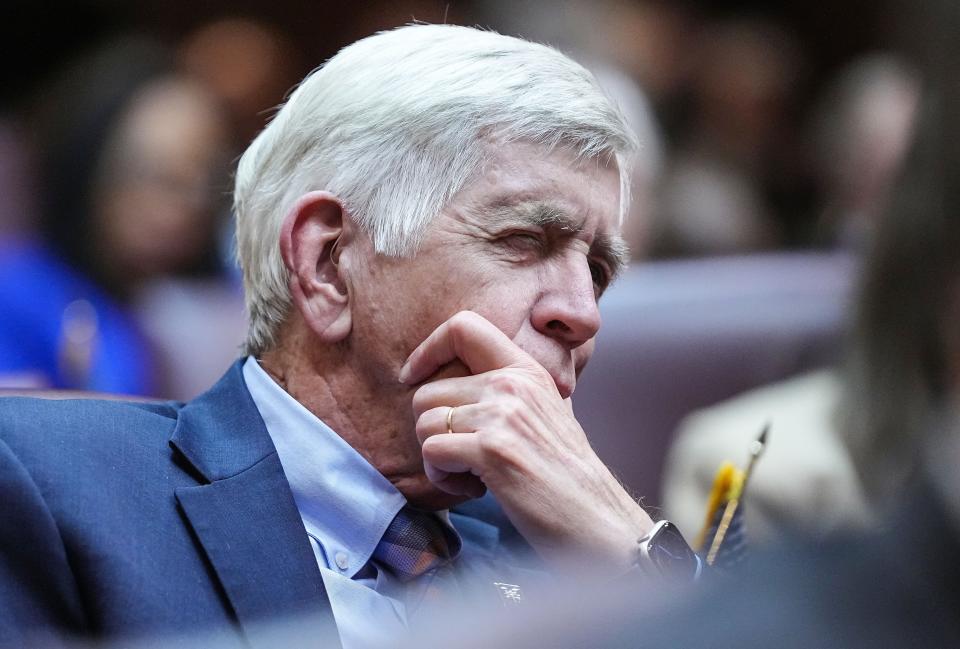Testimony on Blue Line and antisemitism bills, plus more from this week at the Statehouse
This week was tense and suspenseful at the Indiana Statehouse, as the clock ticks down to the end of this short session.
State lawmakers heard hours of argument on some of the most contentious issues, ranging from voter list maintenance to IndyGo’s Blue Line to a higher education bill that one Democratic representative said “launches the first cannon in a culture war which is gonna drag on for years.” But lawmakers won't decide on many of these issues until next week at the earliest.
And as the two chambers trade legislation from earlier this session, the Senate is fighting back on a key House initiative to cancel the downtown special taxing district in Indianapolis.
Here are takeaways from week 7 of the 2024 legislative session:
Blue Line bill sees testimony in House
The House Committee on Roads and Transportation, where Sen. Aaron Freeman’s previous attempts to ban dedicated bus lanes in Indianapolis have died, is keeping many interested parties in suspense until next Tuesday.
The committee heard four hours of testimony on Senate Bill 52, which calls for a one-year moratorium on dedicated lanes to give the state time to study their efficacy. IndyGo argues this delay jeopardizes key federal funding and would take the “rapid” out of bus rapid transit. The vast majority testifying Tuesday supported the Blue Line's use of dedicated lanes.
A handful of business owners turned out to support the ban, arguing that dedicated bus lanes may force traffic onto neighborhood streets or deter customers.
Related: What's the future of the IndyGo Blue Line? Here's what to know.
More than in previous years, House Speaker Todd Huston has expressed an openness to Freeman’s thinking that borders on support. Republican leadership is interested in alternative solutions to fixing Washington Street, such as returning Washington and Meridian Streets back to INDOT's care.
Antisemitism bill gets its day in the Senate
House Bill 1002, the bill to condemn antisemitism in educational settings across the state, passed through the Senate’s education committee Wednesday.
It seemed like a major step for the bill, as the identical version of the legislation died in the Senate last year after unanimously passing the House. But while the bill moved out of committee, nobody is happy with it at this point.

The bill, from Rep. Chris Jeter, R-Fishers, saw amendments on Wednesday that removed references to the International Holocaust Remembrance Alliance definition of antisemitism, a major part of objections from people who testified in the House against the initial bill. The IHRA definition includes criticism of Israeli policies as examples of antisemitism.
Several people, including a representative of the Indiana Muslim Advocacy Network, told the committee they withdrew their opposition to the bill after the IHRA definition was removed. But Jewish students, leaders of local Jewish organizations and rabbis who testified said they would not support the bill without the IHRA definition.
Senators in the committee seemed unsure how to proceed but ended up moving it forward with the hope of debating more amendments on the floor.
“If we kill it, we’ve done nothing,” said Sen. Jean Leising, R-Oldenburg.
Democrats efforts to gut, slow down higher ed bill fail
House Democrats this week put up several fights to stall Senate Bill 202, the controversial higher education bill from Sen. Spencer Deery, R-West Lafayette.
Senate Bill 202 passed with some amendments in the House Education committee on Wednesday, but it still includes provisions that would allow university trustees to consider not granting tenure or promotions if a faculty member does not allow free expression and diverse viewpoints in the classroom.
House Democrats took procedural steps to change the bill, but with the party in the superminority, none of the efforts passed. But each of these steps gave House Democrats a chance to speak on Senate Bill 202, and they took those opportunities to criticize it heavily.

Rep. Ed DeLaney, D-Indianapolis, on Wednesday presented an amendment that would have eliminated the free expression components of the bill, which failed. During what is typically an administrative step to approve reports from legislative committees, Democrats objected to the Republican report on amendments for Senate Bill 202 and offered a different report on how to amend the bill.
Rep. Matt Pierce, D-Bloomington, asked for the bill to be sent to the Ways and Means committee for further discussion. A fiscal report on Senate Bill 202 predicted higher work loads for state educational institutions, including potentially hiring more staff.
Pierce said hiring more staff to meet the requirements of the bill deserved a review by a fiscal committee. Pierce's proposal also failed, and the Bloomington lawmaker shared harsh words with the chamber.
“What’s going to become clear to everyone is that while we’re pinching pennies in every single way of things that impact our constituents, when it comes to our own ideological priorities, money is no object,” Pierce said.
Amendment targets attorney general discipline
It’s rare for a bill amendment to have a mystery author.
However, an anonymous amendment limiting who can run for attorney general was tacked onto an elections bill on Monday. A Legislative Services Agency staffer explained the addition to House Bill 1265, which passed committee 6-2 and is awaiting a final floor vote in the Senate.
The bill says that someone who has received a disciplinary sanction from the Indiana Supreme Court that entails disbarment or suspension of their law license without automatic reinstatement within one year of the election cannot run for attorney general.
This doesn’t apply to Attorney General Todd Rokita at this point. But there are new complaints against him still working through the Indiana Supreme Court's attorney discipline process.
Neither Committee Chair Sen. Mike Gaskill, R-Pendleton, nor the bill's author Rep. Timothy Wesco, R-Osceola, answered questions about who wrote the amendment.

But the purpose, Senate President Rodric Bray said, is to make sure Indiana law explicitly addresses this particular kind of situation. Current law says only that a candidate for attorney general must have lived in Indiana for two years and been "admitted to the practice of law in Indiana" for at least five years ― a line that doesn't directly address suspensions.
"It's probably something that needed to be done years ago and this has come up this year," Bray said.In 2020 former Attorney General Curtis Hill's law license was suspended, just before the Republican party's convention
Rokita might have a challenger: Madison County Prosecutor Rodney Cummings has said he is exploring a run.
Through a spokesperson, Rokita said the amendment is bad for voters and taxpayers.
“Deep state players, like backroom legislators, are taking the people’s power away and giving it to secret committees who are accountable to no one,” he said. “The fact that the language is limited to an election year cycle just shows that this is about politics and completely devoid of policy.”
Senators want to save Indianapolis Mile Square tax
Republican Senators played a key role in inserting language into last year's budget that allowed Indianapolis to create a special taxing district for improvements downtown.
The House wanted to repeal that this year and passed a bill doing just that.
But Senate Republicans are trying again to rescue it. The Senate Tax and Fiscal Policy Committee unanimously approved changes to the bill that keeps the taxing district intact but exempts apartment owners, whose lobbying voice, the Indiana Apartment Association, presented the most vocal opposition to the tax.
This will likely be a battle when the House and Senate have to come to a final agreement. The House is so passionate about repealing this that Huston came down from his pulpit to speak on the floor about it, which is rare.
"We created a special tax on a select group of people for a specific area," he said on Jan. 30. "And I don't know why we would do this. And that’s our fault. It wasn’t properly vetted. We should acknowledge that. That’s how we got here today."
Happy Hour passes Senate, but expect disagreement
The House and Senate seem to agree that they want to bring back “happy hour” for Indiana restaurants after a 40-year ban.
But they can't agree on a provision that allows restaurants to sell cocktails made in house to-go.
The Senate stripped out that part of House Bill 1086; the House is likely to disagree and force the bill into a conference committee to work it out.
Contact IndyStar state government and politics reporter Kayla Dwyer at kdwyer@indystar.com or follow her on Twitter@kayla_dwyer17.
Contact IndyStar's state government and politics reporter Brittany Carloni at brittany.carloni@indystar.com or 317-779-4468. Follow her on Twitter/X @CarloniBrittany.
This article originally appeared on Indianapolis Star: Indiana lawmakers hear testimony on Blue Line, antisemitism bills

